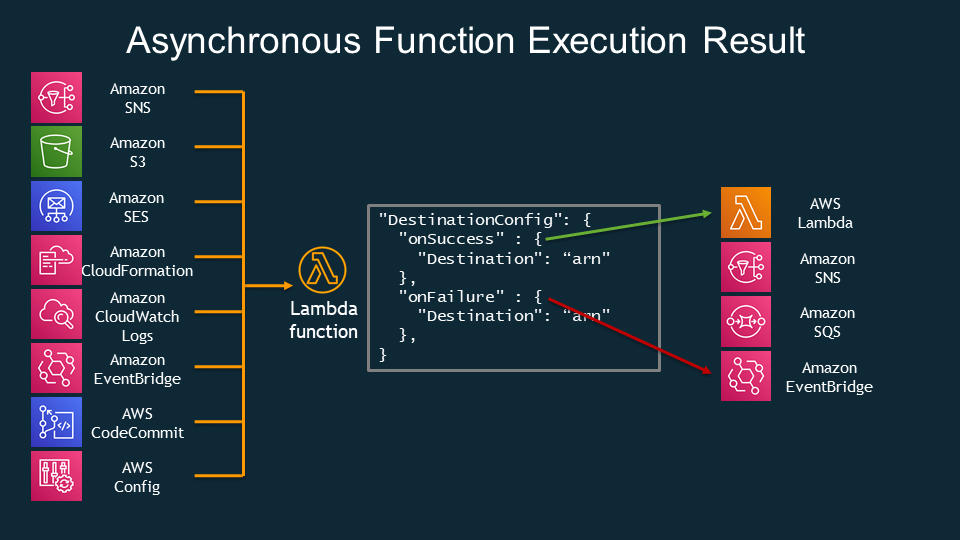AWS Compute Blog
Tag: AWS Lambda
Using Amazon RDS Proxy with AWS Lambda
Update – June 30, 2020: Amazon RDS Proxy support for MySQL and PostgreSQL is now generally available. Update – April 8, 2020: We have announced Postgres compatibility with the Amazon RDS Proxy. Version 10.11 and 11.5 are supported in the preview. The AWS Serverless platform allows you to build applications that automatically scale in response to demand. […]
ICYMI: Serverless pre:Invent 2019
With Contributions from Chris Munns – Sr Manager – Developer Advocacy – AWS Serverless The last two weeks have been a frenzy of AWS service and feature launches, building up to AWS re:Invent 2019. As there has been a lot announced we thought we’d ship an ICYMI post summarizing the serverless service specific features that […]
Tracking the state of AWS Lambda functions
AWS Lambda functions often require resources from other AWS services in order to execute successfully, such as AWS Identity and Access Management (IAM) roles or Amazon Virtual Private Cloud (Amazon VPC) network interfaces. When you create or update a function, Lambda provisions the required resources on your behalf that enable your function to execute. In […]
Decoupled Serverless Scheduler To Run HPC Applications At Scale on EC2
This post is written by Ludvig Nordstrom and Mark Duffield | on November 27, 2019 In this blog post, we dive in to a cloud native approach for running HPC applications at scale on EC2 Spot Instances, using a decoupled serverless scheduler. This architecture is ideal for many workloads in the HPC and EDA industries, and […]
A simpler deployment experience with AWS SAM CLI
The AWS Serverless Application Model (SAM) CLI provides developers with a local tool for managing serverless applications on AWS. The command line tool allows developers to initialize and configure applications, debug locally using IDEs like Visual Studio Code or JetBrains WebStorm, and deploy to the AWS Cloud. On November 25, we announced improvements to the […]
Introducing AWS Lambda Destinations
Today we’re announcing AWS Lambda Destinations for asynchronous invocations. This is a feature that provides visibility into Lambda function invocations and routes the execution results to AWS services, simplifying event-driven applications and reducing code complexity. Asynchronous invocations When a function is invoked asynchronously, Lambda sends the event to an internal queue. A separate process reads […]
New AWS Lambda controls for stream processing and asynchronous invocations
Today AWS Lambda is introducing new controls for asynchronous and stream processing invocations. These new features allow you to customize responses to Lambda function errors and build more resilient event-driven and stream-processing applications. Stream processing function invocations When processing data from event sources such as Amazon Kinesis Data Streams, and Amazon DynamoDB Streams, Lambda reads […]
New AWS Lambda scaling controls for Kinesis and DynamoDB event sources
AWS Lambda is introducing a new scaling parameter for Amazon Kinesis Data Streams and Amazon DynamoDB Streams event sources. Parallelization Factor can be set to increase concurrent Lambda invocations for each shard, which by default is 1. This allows for faster stream processing without the need to over-scale the number of shards, while still guaranteeing […]
New for AWS Lambda – SQS FIFO as an event source
AWS Lambda first announced support for Amazon SQS standard queues as an event source in April 2018. This allows builders to develop serverless applications using queues to directly invoke Lambda functions. Today, we have expanded this feature to include SQS FIFO queues. This makes it easier to create serverless applications using queues where the order […]
Java 11 runtime now available in AWS Lambda
We are excited to announce that you can now develop your AWS Lambda functions using the Java 11 runtime. Start using this runtime today by specifying a runtime parameter value of java11 when creating or updating your Lambda functions. The Java 11 runtime does not introduce any changes in Lambda’s programming model, such as handler […]









